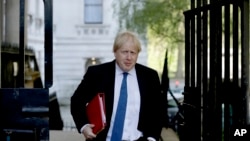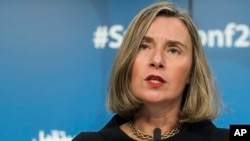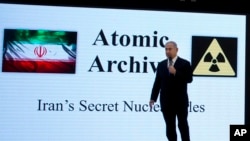America’s European allies are drawing a sharply different collective conclusion from the U.S. about Israeli Prime Minister Benjamin Netanyahu’s dramatic presentation Monday of "evidence” he says demonstrates Iran lied about its nuclear program.
And European diplomats suspect the Israeli leader’s presentation, during which he urged President Donald Trump to scrap the nuclear accord signed in 2015 between Tehran and six foreign powers, was choreographed with the White House. Netanyahu did not directly accuse Iran of violating the accord, but his aim, say analysts, was to counter the intense lobbying of Trump by the Europeans, who say the deal shouldn’t be discarded.
Netanyahu said “half a ton” of secret Iranian documents obtained in an intelligence coup showed Iran was “brazenly lying” when it said it never had a nuclear weapons program, and that it had not honored the agreement by intensifying efforts to hide secret files after signing the deal that obliges Tehran to limit its nuclear energy program.
The Israeli leader based his allegations on approximately 55,000 pages of documents and 183 CDs of secret information Israeli intelligence operatives obtained from a Tehran facility.
Britain’s foreign minister Boris Johnson joined European counterparts Tuesday in defending the 2015 deal, which Trump has to decide by May 12 to renew or walk away from.
“The Israeli prime minister’s presentation on Iran’s past research into nuclear weapons technology underlines the importance of keeping the Iran nuclear deal’s constraints on Tehran’s nuclear ambitions,” Johnson said.
He added: “The Iran nuclear deal is not based on trust about Iran’s intentions; rather it is based on tough verification, including measures that allow inspectors from the International Atomic Energy Agency unprecedented access to Iran’s nuclear program. The fact that Iran conducted sensitive research in secret until 2003 shows why we need the intrusive inspections allowed by the Iran nuclear deal today.”
A spokesman for British Prime Minister Theresa May underlined Johnson’s remarks, saying, “We have never been naive about Iran and its nuclear intentions, that is why the International Atomic Energy Agency inspection regime agreed as part of the Iran nuclear deal is one of the most extensive and robust in the history of international nuclear accords.”
A spokesman for France's foreign ministry says the “pertinence of the deal is reinforced by the details presented by Israel.” And the European Union's foreign affairs chief, Federica Mogherini, said Prime Minister Netanyahu’s disclosures have "not put into question Iran's compliance.”
A French diplomat told VOA the view in Paris is that Netanyahu coordinated his presentation with the White House — underlining the French government’s conclusion that Trump is likely to walk away from the nuclear accord, despite French and European efforts to dissuade him from doing so. Last week, after a three-day visit to Washington, Macron told reporters on his departure from the U.S. capital that he thought that Trump would scrap the deal if only for domestic political reasons.
Providing some credence to the French suspicion of coordination between Israel and Washington, U.S. Secretary of State Mike Pompeo said Monday he had “personally reviewed many of the Iranian files.” He argued, “What this means is the deal was not constructed on a foundation of good faith or transparency. It was built on Iran's lies.”
Several analysts VOA spoke with say the Netanyahu disclosures about secret files show only that Iran once covertly pursued nuclear weapons, a widely held view, though always denied by Tehran. But that the major goal of the Israeli’s leader’s presentation Monday was a public relations one. “Netanyahu’s press conference was likely aimed at shaping U.S. public opinion,” says Hasnain Malik, head of research at the Dubai-based investment bank Exotix Capital.
“It is unclear whether any new information regarding Iran’s nuclear activities was revealed,” he said. “To a degree, this makes it easier for U.S. President Trump to scupper the deal and it raises the ultimate probability of restrictions on Iranian oil exports.”
Other analysts say Netanyahu’s presentation likely will strengthen the hand of those around Trump who want the accord scrapped, including National Security Adviser John Bolton.
Netanyahu’s speech Monday comes as a shadow war between Israel and Iran escalates dramatically in neighboring Syria, where Israel has struck several times at the military bases in the country used by Hezbollah, the Tehran-tied Lebanese Shi’ite militia, and Iranian Revolutionary Guard units. On Sunday, an Israeli airstrike on a base dug into a mountain near the city of Hama killed two dozen Iranian-linked fighters, according to monitors.
Sunday’s airstrike, timed as it was hours before Netanyahu’s speech, underlined the Israeli leader’s overarching message of his readiness to act against Iran, regardless of what happens to the nuclear accord, say European diplomats.







